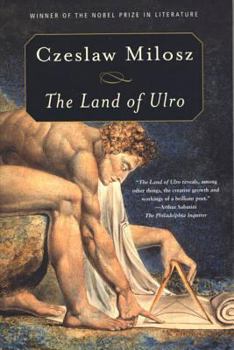The Land of Ulro
Select Format
Select Condition 
Book Overview
This major prose work, originally published in English in 1985, is both a moving spiritual self-portrait and an unflinching inquiry into the genesis of our modern afflictions. A man who was raised a Catholic in rural Lithuania, lived through the Nazi occupation of Poland, and emerged, first in Europe and then in America, as one of our most important men of letters, speaks here of the inherited dilemmas of our civilization in a voice recognizable for...
Format:Paperback
Language:English
ISBN:0374519374
ISBN13:9780374519377
Release Date:May 2000
Publisher:Farrar, Strauss & Giroux-3pl
Length:304 Pages
Weight:0.55 lbs.
Dimensions:0.9" x 5.4" x 8.2"
Customer Reviews
1 rating
Compare Ulro, a realm of spiritual pain, to Gombrowicz
Published by Thriftbooks.com User , 19 years ago
There are particular paths in the field of intellectual history that are so famous, after years of study, anyone is likely to expect certain names to appear in a certain order. For those familiar with the work of William Blake, Czeslaw Milosz's title THE LAND OF ULRO suggests an explanation of a particular vision in some obscure prophetic and poetic work. A scholarly approach would include an index in which all the pages mentioning Ulro could be identified and checked sequentially or by particular topics to clarify how Ulro is understood in this book. But actually, Czeslaw Milosz is a poet, winner of the 1980 Nobel Prize for Literature, who summed up the twentieth century in a book called ROAD-SIDE DOG (1998) by remembering a slow trip by two-horse wagon. "And always we were barked at by a dog, assiduous in its duty. That was the beginning of the century; this is its end." (NEW AND COLLECTED POEMS (1931-2001), p. 645). Rather than being an intellectual history, this is more like a memoir of intellectual roots that was written in Polish (ZIEMIA ULRO) in 1977, and a Preface in English by Czeslaw Milosz dated 1984 apologizes for "too many allusions to poets and critics unavailable in English translation." (p. vi). The translator Louis Iribarne provides notes on pages 277-287 for many of the names in the text, and seems particularly knowledgeable about Witold Gombrowicz (1904-69) on pages 277-278 and characters from his novel FERDYDURKE Professor Pimko and Miss Youthful on page 279. The poet Adam Mickiewicz (1798-1855) has a ballad "The Romantic" on pages 97-99, translated into English by W. H. Auden. Considered "The first in Polish literature to bear the title of a *wieszcz*--a vatic bard endowed with the properties of a charismatic national leader" (p. 282) Mickiewicz is also explained with reference to his major works, including a play in which "its poet-hero Gustav [is] reborn as the rebel Konrad." (p. 283). People who have already read FERDYDURKE as a comic romp on the Polish pride in Polish poets might approach THE LAND OF ULRO as a more serious contemplation of the same theme by someone who deserves the respect that comedy lacks. Gombrowicz and Czeslaw Milosz were both educated in law before achieving fame as authors who spent much of their lives in the West. THE LAND OF ULRO attempts to explain how the study of literature is so much like a dog chasing its own tale that legal studies seem closer to reality. The ultimate state of our culture is suggested by the reflection in this book on seeing a photograph of Albert Einstein on the wall of a restaurant. "I stared up at the face, recalling how moved, how humbly respectful I had been, when many years ago I had made his acquaintance at Princeton. To me he was not only a scientist; he had stepped quite suddenly from the pages of ARS MAGNA and LES ARCANES." (p. 226). That observation is from the end of section 35 of this book. Section 31 begins with the observation, "In 1924 a





